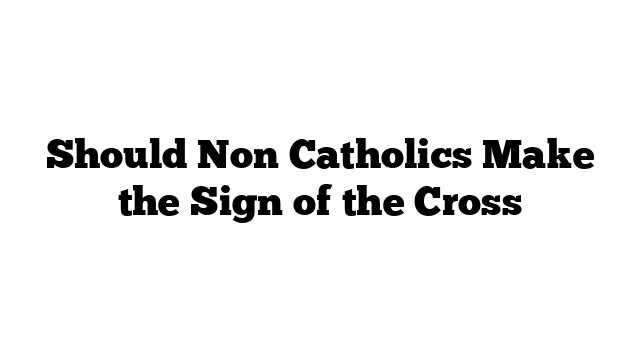Beliefs & Practices
Should Non-Catholics Make the Sign of the Cross
Introduction
The sign of the cross is a significant religious gesture for Catholics, symbolizing their faith in the Holy Trinity. However, for those outside the Catholic faith, the question arises, should non-Catholics make the sign of the cross? In this article, we will explore different perspectives on this topic and provide insight into the religious significance and potential implications of non-Catholics making the sign of the cross.
Understanding the Sign of the Cross
The sign of the cross involves tracing a cross shape with the right hand, touching the forehead, chest, left shoulder, and right shoulder. It is a visible expression of belief in the Father, Son, and Holy Spirit and serves as a reminder of the crucifixion and resurrection of Jesus Christ.
Catholic Perspective
From a Catholic standpoint, the sign of the cross holds substantial spiritual importance. It is not only a personal devotion but also a sacramental, a sacred object or action that connects believers to God’s grace. Catholics are encouraged to make the sign of the cross as a way to invoke God’s blessing, seek protection from evil, and express their faith in times of joy or sorrow.
Non-Catholic Perspectives
While the sign of the cross is primarily associated with Catholicism, non-Catholics have varying opinions on whether they should participate in this practice. Some non-Catholics argue that making the sign of the cross aligns too closely with Catholic beliefs and may be seen as a sign of acceptance or conformity to Catholic doctrine.
Others take a different approach, believing that the sign of the cross is a valid Christian tradition that can be embraced by all believers. They argue that the significance of the cross is not exclusive to Catholicism and that making the sign of the cross can serve as a reminder of Jesus’ sacrifice and an expression of faith in the Christian God.
Respecting Differences
It is important to recognize and respect the diversity of religious traditions and practices. While some non-Catholics may feel comfortable making the sign of the cross, others may choose not to participate for personal or theological reasons. Ultimately, it is a personal decision that should be made with respect and sensitivity towards one’s own faith tradition and the beliefs of others.
Implications and Intentions
When considering whether to make the sign of the cross as a non-Catholic, it is crucial to reflect on one’s intentions and the potential impact on others. If participating in a Catholic setting, non-Catholics may choose to follow the lead of those around them out of cultural respect or observance of a specific event (such as a wedding or funeral). However, it is essential to do so with an understanding of the sign’s significance and without compromising one’s own faith beliefs.
Inclusive Worship
The act of making the sign of the cross should not be a barrier to inclusive worship. Churches and religious communities are encouraged to create welcoming environments where people of different denominations can worship together without feeling pressured to engage in practices that conflict with their beliefs.
Conclusion
In conclusion, the question of whether non-Catholics should make the sign of the cross is ultimately a personal choice. While some non-Catholics may feel comfortable participating in this practice, others may opt not to do so due to theological differences or a desire to maintain the integrity of their own faith tradition. Regardless of one’s decision, it is essential to approach this topic with respect, sensitivity, and an understanding of the diverse beliefs within the Christian community. In fostering inclusive worship spaces, churches can ensure that people of all faith backgrounds can come together without compromising their individual beliefs.

